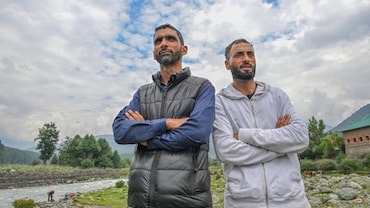- HOME
- /
- True Stories
- /
- My Story
- /
Worth her Weight
A woman’s journey towards reconciliation with her own unruly body
 illustration by Siddhant Jumde
illustration by Siddhant Jumde
For as long as I can remember, my body and I have shared a relationship of quiet discontent. Growing up, I was skinnier than the kids around me—a fact I would have been wholly unaware of, had it not been pointed out to me, mainly by adults, and then—as they do—by kids following their example.
I remember the first time I was told I wasn’t an attractive child. A ‘friendly’ neighbourhood aunt advised that if I wanted to look pretty—and find a good husband—I must put on some weight. After all, no one wants a bag of bones. As a nine-year-old, I hadn’t yet learnt to judge my body by the metric of acceptable appearance, or wonder where I stood in the beauty pecking order.
As the years rolled by, comments about my skeletal frame continued to pour in. Of course, every unsolicited comment uttered was accompanied by the assurance that it was all out of concern for my well-being. There onwards my relationship with food transformed. Food was no longer nourishment—it was now weaponized. I started making conscious efforts to eat more, even if I wasn’t hungry, but no matter how much I gorged, I stayed thin and lanky for years, until puberty hit me like a freight train. For a very long time, I rued that day. I started putting on weight almost immediately, and this time I wasn’t trying to. I remember feeling happy as I began to fill out. No one would call me a bag of bones anymore. My joy didn’t last long however.
I was 13 when I was first called fat. I had finally managed to put on weight as I had been routinely told to do till then, but now I was too heavy, too chubby. At five feet, I now weighed 58 kg. Friends and neighbours would think nothing about commenting on my size, doling out weight-loss advice or cracking jokes. As I entered my late teens, I had completely lost confidence in my body and, subsequently, in myself.
As my physical self grew, my sense of self shrank just as much. Having failed to live up to conventional beauty norms, I was convinced that if I wanted to be loved, I needed to offer more. I compensated by being overly accommodating of everyone around me. In hindsight this only exacerbated the dysfunctional relationship with my body.
I entered adulthood thinking I wasn’t ‘enough’—an idea that was seeded not only by the fact that ‘skinny’ is celebrated, but also by the language associated with accounts of losing weight or being thin: think self-improvement, discipline—all virtues. By the same yardstick, not being able to match that aesthetic quickly categorizes you as lazy, indiscplined, unhealthy.
Consumed as I was by thoughts of the way my body looked, how it moved, how much space I was taking up, what I was eating, I didn’t notice the other ways my body needed attention. I failed to realize, for example, that my period was much heavier and more painful than ever before. By my twenties, each cycle and its accompanying agonies became worse, continuing for months. I struggled to find a gynaecologist who would take my symptoms seriously but most couldn’t look past how much I weighed, which was cited as the primary cause of my symptoms. Thinning down would quickly fix all.
Doctors were quick to dismiss my appeals—all women go through it and do so without whining, I was told, along with the reminder that I must retain my ability to bear children. My suffering paled in light of my reproductive capacity. I felt sure, however, that everything I was going through was not ‘normal’ at all.
 The author
The author
After multiple misdiagnoses, several different rounds of medication and seven different doctors, I finally found one who took my symptoms seriously and identified my problem as adenomyosis, a condition that affects the uterine lining. Losing weight would help alleviate some of the symptoms but the side effects of my medication made shedding kilos much harder. I was stuck in this vicious cycle. There seemed to be no way out. By the end of 2019, I weighed over 80 kilos.
Two surgeries, several courses of medications and numerous side effects later, I have still not completely made peace with how this condition has affected me. I was always made to feel that my weight was the root of a lot of problems in my life; I have learnt this is not true. After a lot of self-reflection and some professional help, I realized I never learnt to like myself because I was made to believe my self-worth was related to how much I weighed. While two decades of internalized self-loathing cannot be undone overnight, I have taken the first few steps to acceptance. I am far from comfortable in my own skin but how I view health has changed. I try and follow a routine of eating and exercise that is sustainable for me and resist the urge to constantly weigh myself.
I am now much lighter, in body and mind, but I continually tell myself that progress is more than watching that number on the scale drop. While I remind myself of how much my body has gone through and helped me get through as well, I also remember that I am more than my clothing size.
There are days I find myself scrolling through social media, and once again, hear the voices that say I am too fat to be loved, to be worthy, to be beautiful, but I am learning not to dwell on that thought for long—not be defined by someone else’s standard of beauty and womanhood. As long as I like myself, just the way I am, opinions at the end of the day, are just water off a duck’s back.






